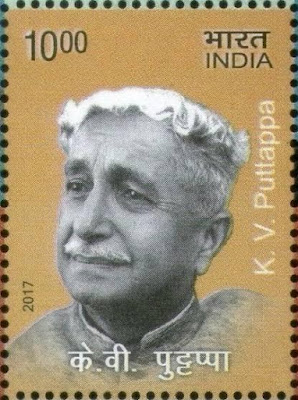K. V. Puttappa, also known as Kuvempu, was a prominent Indian poet, playwright, novelist, and critic who wrote predominantly in the Kannada language. He was born on 29 December 1904, in Hirekodige near Bommalapura in Chikmagalur district of Karnataka, India. Kuvempu is widely regarded as one of the greatest literary figures in the Kannada language and played a significant role in the modernization of Kannada literature.
Some key points about K. V. Puttappa (Kuvempu) include:
Literary Contributions: Kuvempu's literary works encompass various genres, including poetry, plays, novels, essays, and short stories. He wrote with a strong emphasis on human values, social issues, and the need for a harmonious coexistence between humans and nature.
Magnum Opus: His epic poetic work, "Sri Ramayana Darshanam," is considered a masterpiece. It is a modern rendering of the Indian epic Ramayana, and Kuvempu received the Jnanpith Award, one of the highest literary honors in India, for this work in 1967.
Philosopher and Educationist: Kuvempu was not only a literary figure but also a philosopher and educationist. He served as the Vice-Chancellor of the University of Mysore and made significant contributions to the field of education.
Rashtrakavi: Kuvempu was conferred with the title "Rashtrakavi" (National Poet) by the Government of India in recognition of his outstanding contributions to Indian literature.
Legacy: Kuvempu's influence extends beyond literature. He was an advocate for social reform, environmental conservation, and the promotion of Kannada language and culture.
Kuvempu passed away on 11 November 1994, leaving behind a rich literary legacy that continues to inspire readers and scholars in Karnataka and beyond. His contributions have had a lasting impact on Kannada literature and cultural life in India.

No comments:
Post a Comment